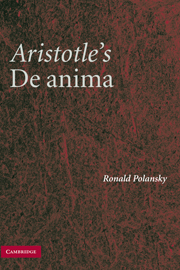Book contents
- Frontmatter
- Contents
- Preface
- List of Abbreviations
- Introduction
- COMMENTARY ON DE ANIMA: : Book 1
- COMMENTARY ON DE ANIMA: Book 2
- COMMENTARY ON DE ANIMA: Book 3
- 1 In the World As It Is There Can Be but the Five Senses
- 2 What Allows for Perceiving That We Perceive; Sense Joins in a Common Power so That the Five Senses Are Subfaculties of a Central Sense Faculty
- 3 Distinguishing Sense and Thought; What Is Phantasia?
- 4 What Is Mind as That Capable of Thinking All Things
- 5 What Enables Thinking to Occur
- 6 The Sorts of Intelligible Objects
- 7 Phantasia Has a Role in All Thinking
- 8 That Mind Can Think All Things
- 9 There Is a Capacity for Progressive Motion
- 10 The Desiderative Capacity Is the Primary Cause of Progressive Motion
- 11 Even the Simplest Animals Have Indefinite Phantasia, and Calculative Phantasia Fits the Account of Progressive Motion
- 12 The Necessary Order of the Faculties of Soul
- 13 The Sort of Body Requisite to Support the Order of the Faculties of Soul
- Bibliography
- Index
12 - The Necessary Order of the Faculties of Soul
Published online by Cambridge University Press: 18 December 2009
- Frontmatter
- Contents
- Preface
- List of Abbreviations
- Introduction
- COMMENTARY ON DE ANIMA: : Book 1
- COMMENTARY ON DE ANIMA: Book 2
- COMMENTARY ON DE ANIMA: Book 3
- 1 In the World As It Is There Can Be but the Five Senses
- 2 What Allows for Perceiving That We Perceive; Sense Joins in a Common Power so That the Five Senses Are Subfaculties of a Central Sense Faculty
- 3 Distinguishing Sense and Thought; What Is Phantasia?
- 4 What Is Mind as That Capable of Thinking All Things
- 5 What Enables Thinking to Occur
- 6 The Sorts of Intelligible Objects
- 7 Phantasia Has a Role in All Thinking
- 8 That Mind Can Think All Things
- 9 There Is a Capacity for Progressive Motion
- 10 The Desiderative Capacity Is the Primary Cause of Progressive Motion
- 11 Even the Simplest Animals Have Indefinite Phantasia, and Calculative Phantasia Fits the Account of Progressive Motion
- 12 The Necessary Order of the Faculties of Soul
- 13 The Sort of Body Requisite to Support the Order of the Faculties of Soul
- Bibliography
- Index
Summary
Two main tasks remain to complete in the treatment of soul. Near the beginning of the De anima it was announced that the investigation of soul is to disclose its nature and essence along with its accidents (402a7–8). These accidents are especially the operations of living things: nourishing themselves, perceiving, walking, swimming, flying, thinking, and so on. Presumably these somehow have to be demonstrated as following from the accounts of the soul and its capacities (see 402b16–403a2). Moreover, in book 2 in 413b9–10, 413b33–414a1, and 414b33–415a1 Aristotle announced that additional discussion is forthcoming about why the soul has certain capacities in succession. Why does nutritive capacity have priority over all other capacities of soul, and similarly all the other capacities presuppose the capacity for sense perception, while touch is the most fundamental sense? Now the anticipated treatment appears in confirmation of his whole approach to the soul and the soul's relation to body. If certain faculties of soul are necessary in succession, then their operations, the main accidents of the soul, are demonstrated as necessary. Achievement of this demonstration supports the definitions upon which it is based.
The argumentation here is teleological and hypothetical; that is, certain parts must be present if certain functions are to be performed and natural ends to be attained. The ends at issue are life and the good life that entered into the very definition of soul in ii i.
- Type
- Chapter
- Information
- Aristotle's De AnimaA Critical Commentary, pp. 534 - 545Publisher: Cambridge University PressPrint publication year: 2007



